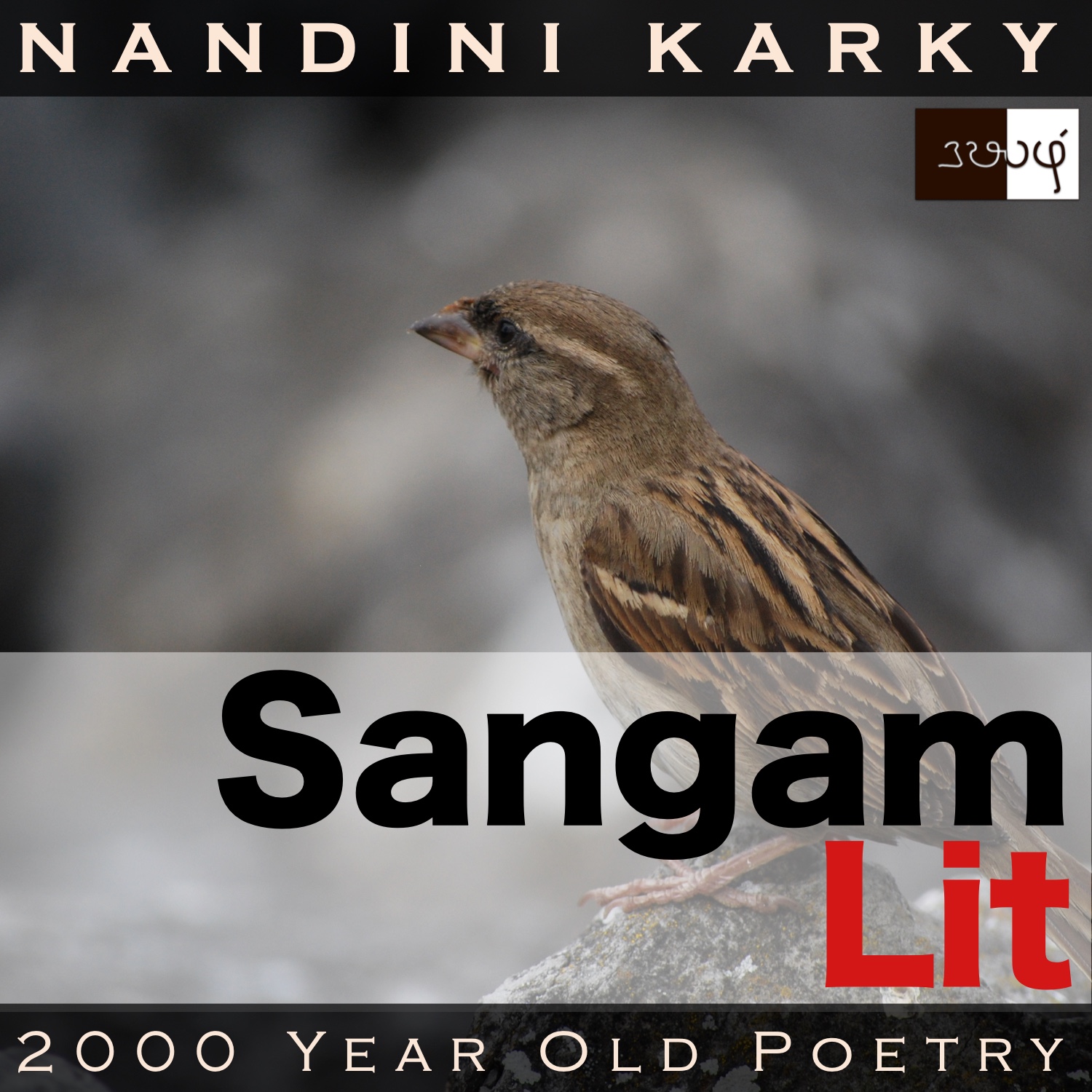Podcast: Play in new window | Download
Subscribe: Apple Podcasts | Spotify | Amazon Music | Android | iHeartRadio | TuneIn | RSS | More

In this episode, we marvel at the maturity of love, engrained in Tamil Sangam Literary Work, Natrinai 24, written by Kannathanaar, set in the ‘Paalai’ or the drylands, in the words of the lady to her confidante, when informed about her man’s departure.
பார் பக வீழ்ந்த வேருடை விழுக் கோட்டு
உடும்பு அடைந்தன்ன நெடும் பொரி விளவின்
ஆட்டு ஒழி பந்தின் கோட்டு மூக்கு இறுபு,
கம்பலத்தன்ன பைம் பயிர்த் தாஅம்
வெள்ளில் வல்சி வேற்று நாட்டு ஆர் இடைச்
‘சேறும் நாம்’ எனச் சொல்ல சேயிழை,
‘நன்று’ எனப் புரிந்தோய், நன்று செய்தனையே;
செயல்படு மனத்தர் செய் பொருட்கு
அகல்வர் ஆடவர், அது அதன் பண்பே.
When looking at these lines with a child’s curiosity, my eyes sparkled reading ‘உடும்பு’ meaning ‘monitor lizard’ and holding hands with it, a ‘விளவு’, the wood-apple tree that we encountered in Natrinai 12. I’m noticing this pattern in the few Sangam poems we have explored that the Tamils had a way of connecting the flora and fauna in their poetry. Seeing animals in plants and vice versa. To me, this echoes an understanding of the oneness of all life. There’s a simplicity in the statement, ‘‘நன்று’ எனப் புரிந்தோய், நன்று செய்தனையே;’ the meaning of which, we will see in a while. The structure of the finishing couplet reminded me of pithy Thirukkural verses and I got an inkling it held in its grasp, a profound philosophy.
Seeing through the eyes of experts, our knowledge expands to know the meaning and context of the verse. The lady’s confidante comes to the lady with news of the man’s departure. She’s a little worried about how the lady might take it. Upon hearing it, the lady says,“Splitting open the earth, falls the roots of the wood apple tree, with soaring, spreading branches and a bark, cracked and scaly as if coated with monitor lizards. Leaving the high branches of the tree, the wood-apple fruit lies looking like a tired ball at the end of play, strewn all around the blanket of green bushes. There’s no other food other than the wood apple in that land. And when my man intended to depart there, saying he will walk through this harsh path to reach another country, my dear friend, you said to him, ‘Good’ and let him leave. It’s a good thing that you have done, for men are intent on action and they go in search of wealth. It’s the nature of things.’
Let us sense this poem with our mind’s eye. First stop, the wood apple tree! Previously in Natrinai 12, we discussed the smell of the wood-apple and marvelled at how, two thousand years ago, it reminded people of butter and today’s travellers associate with cheese. I recently learnt that another name for the fruit is ‘curd-fruit’. There’s another diary connection for you! In this poem, we take in the sight of the tree entire. A description for the wood-apple tree I found on the web says in its unsentimental language, ‘The bark is ridged, fissured and scaly and there are sharp spines’. With fewer words and an immediate imagery, our poet makes this flash before our eyes with ‘உடும்பு அடைந்தன்ன நெடும் பொரி விளவு’ meaning ‘as if coated with monitor lizards, appears the cracked bark of a wood apple tree.’ We find similes and science, saying the same thing in different ways. One approach is emotion-based and the other, intellect-based. Leading on from that duality, we find this echoed in the attributes of the lady and the man. The lady is portrayed as one yearning for love and the man as one seeking wealth. While that is so, the lady impresses us with her maturity in accepting reality. ‘Indeed, he has left. So be it. It’s nature.’, she says. In that Tamil society, two thousand years ago, it was natural for men to part in search of wealth and the women to remain in wait. Times have changed and we find that both men and women go in search of wealth and purpose. Different dreams, individual aspirations are all what makes up the fabric of modern society. So, how much more acceptance is needed when the pull is in both directions, in our twenty-first century lives? What would be the nature of acceptance here? Perhaps, it would mean understanding the dreams of the other partner. Accepting that love may not remain the same, racy thing, spoiling you with utter attention, from the beginning to the end. Love would mean seeing the other change and accepting that change. If, at the beginning of your relationship, you were hardly apart for a few hours a day and as the years rolled by, you find that it’s but a few hours a day you see each other, then as the lady shows the way, perhaps you should whisper to your mind, ‘It’s the nature of things’. To accept and learn to fly towards your own dream!




Good Thank you
Brilliant!